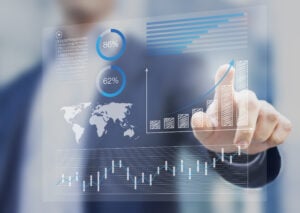Self Service 2.0: how to achieve Data Democratization

In a constantly evolving world, it is key to anticipate the trends that will mark the future of the pharmaceutical industry. As Robert Greene put it: “The future belongs to those who learn more skills and combine them more creatively.” The use of innovative industry technologies will be essential to lead the business environment towards the “Next Normal.”
Next Generation Self Service
Let’s delve into the new era of Self Service 2.0, a trend that we have to keep on our radar as it’s going to have a significant impact in the near future. In the current scenario, pharmaceutical companies will need to anticipate that value-generating information and insights will be available to their teams within analytics systems and not only be a source of reporting.
The Cloud has become an essential tool and allows pharmaceutical companies to access all kinds of information and to start analytics environments very quickly. The adoption of the Cloud is ending static reporting, guided analytical reporting and introducing a new generation, the Self-Service 2.0.
In this era, pharmacists will use technologies that will leverage natural language processing (PLN) and AI to query their data warehouse and instantly generate analytics to answer their questions. AI will be integrated into these technologies to provide information that previously did not exist, learning what is relevant to each person in order to provide recommendations and develop questions that the user had not even thought of.
But how do we apply all of this to our companies? Let’s look at some cases of self service 2.0 use in the pharmaceutical industry.
Clinical Trials: autonomy and agility in obtaining relevant data
R&D units have always had the need to understand what kinds of studies are being done in a given area when deciding on initiatives to focus their efforts.
The availability of analytical environments that allow the search of related information based on algorithms that define the correlation between similar studies is key to expediting the processes in early stages of the research of new products.
Through search mechanisms that allow for consultations on structured (study characteristics) and unstructured data (study content), scientists have autonomy in obtaining relevant data while interacting with them.
These strategies are valid for both the laboratory’s own studies and those of other entities as they allow us to understand where the rest of the market is putting their efforts.
Information for everyone: the answers to our questions
The dashboards and reports that exist in organizations are often too complex to get quick answers. They’re very useful for analyst profiles that want to go into detail, but in environments as changing as the pharmaceutical world, it’s important to complement traditional analytics with ad-hoc question-answering tools.
Through self-service 2.0, we can introduce tools that allow you to ask questions through natural language and provide quick and concise answers. Moreover, thanks to advances in the field of artificial intelligence, these tools are capable not only of providing a specific answer, but also of searching the data themselves to find the reasons for such a response. This makes it very easy to understand the reasons for a given behavior based on an initial question.
These tools are very useful not only for management profiles, but also for accounts managers, merchants and marketing teams who need to have control over sales. Implementing a search bar to ask questions that the system is answering allows you to get real-time information and have a 360° business view. In this way, users can get their own reports in a few minutes and make decisions instantly, without needing technical training.
We increasingly see the democratization of these tools towards all profiles as part of the company’s strategy to promote data culture.
In conclusion, we would point out that there is an essential factor in this trend: ease of use. Not all employees in a company have a job where they need a laptop or an expert in data and analytics. Yet everyone has questions that only the data can answer. Autonomy is a necessity and this is where Self-Service 2.0 comes into play, to enable all teams to make data-driven decisions using the devices they are most familiar with.
We help companies to create data-strategies & roadmaps,
design and implement cloud data & analytics architectures
and incorporate data governance solutions.


